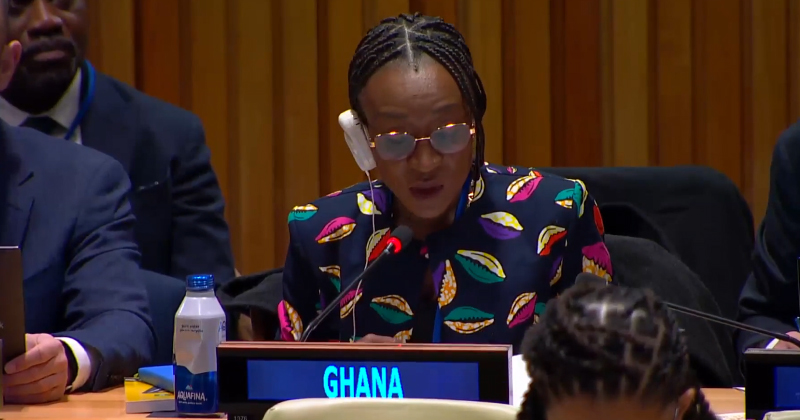Statement by Ghana at 2024 ECOSOC Financing for Development Forum

- Posted by admin
- Posted in News, Statement & Remarks, UN News
Hon. Abena Osei Asare,
Minister for Finance
United Nations, New York
April 22, 2024
GENERAL DEBATE OF THE 2024 ECOSOC FORUM ON FINANCING FOR DEVELOPMENT FOLLOW-UP
Madam President,
Excellencies,
Ghana aligns herself with the statements delivered by the G77 and China and Africa Group and makes the following additional remarks in its national capacity.
We meet here today at a sobering time for humanity and for the achievement of the SDGs. Lingering old conflicts, and new conflicts are being waged with ferocity. Decades of development gains have been reversed while hopes of achieving the SDGs hang perilously in balance. As the Deputy Secretary General observed last year, “ the SDGs are issuing an SoS.” How do we collectively respond to the urgent call to rescue the SDGs particularly heading into the Fourth International Conference for Financing and Development in 2025?
For Ghana we believe our collective response must involve a major transformation of international cooperation. This transformation should be human centered, protect the vulnerable especially during crisis, invest in people and should not only address the urgent needs today but the needs of tomorrow.
In this regard, we urge developed countries to scale up and fulfil their respective official development assistance commitments, including the commitment by many of them to achieve the targets of 0.7 per cent of gross national income for official development assistance to developing countries and 0.15 to 0.20 per cent to the least developed countries.
Madam President,
Transforming international cooperation is intrinsically linked to the reform of the current international tax cooperation structures. We stress that the current international tax governance structures need considerable improvements. For us, a system that was not established for everyone, cannot be a system that will deliver just or equitable outcomes to all. We are committed to strengthening the inclusiveness and effectiveness of tax cooperation at the United Nations and support the outline and modalities and the work of the Ad Hoc Committee to Draft Terms of Reference for a United Nations Framework Convention on International Tax Cooperation. We call upon all countries to continue engaging constructively in the process toward developing a United Nations framework convention on international tax cooperation.
We continue to call for the reform of the global financial architecture to make it fit for purpose and respond to the needs of developing countries. Africa must be at the center of these reforms. It is time for a serious conversation about the high cost of capital that burdens Africa, which is based on unfair risk premiums and inaccurate valuation of our economies. In this regard, we welcome the launch of the Africa Club by the Presidents of Ghana, Kenya and Zambia. This Club is an alliance of African multilateral financial institutions that will serve as a powerful negotiator on behalf of the continent, coordinate with global financial institutions and leverage African countries’ balance sheets to increase investment and jobs. To this end, Ghana has proposed that each African Country go beyond its existing paid in capital and invest a minimum of 30% of its sovereign reserves in African multilateral institutions.
Other areas for key action for African countries in this regard include increasing concessional finance, channelling special drawing rights held at IMF to African financial institutions so that can be leveraged for development finance, finding a robust solution to the debt crisis, which should require overhauling the Common Framework and increasing Africa’s role in global decision making.
Madam President,
Excellencies,
On the domestic front, we have responded to the continued impact of the global economic challenges and built resilience in our economy, We adopted a bottom-up approach towards sustainably financing our development. To that end, we have the Integrated Assembly financing framework (IAFF), which represents the first step in our INFF process. The IAFF is assisting local governments identify, consolidate, and optimize possible revenue streams, and it is assisting Ghana uncover and explore innovative financing sources at the grassroots level.
In undertaking these reforms, it was important to safeguard vulnerable people. Therefore, we doubled the benefits under the existing targeted cash transfer program, the Living Empowerment Against Poverty. In the education sector, allocations toward the Ghana School Feeding Program and the Capitation Grant also received a boost while in the health sector, Ghana has increased the allocation to the National Health Insurance Authority.
Two years ago, domestic challenges coupled with the global monetary policy tightening, triggered a decline in international investor confidence in Ghana. This resulted in us loosing access to the international capital markets and exacerbating pressures on domestic economic issues including declining international reserves, currency depreciation, and accelerated inflation. We turned to the International Monetary fund to support us implement a program to get the economy back on track, the IMF backed -Post Covid-19 Program of Economic Growth. (PC-PEG).
I am happy to report that out economy is showing signs of stabilization thanks to our steadfast implementation of the IMF-supported economic program. We took bold steps to restore macroeconomic stability. Our growth is proving to be more resilient and robust with all the macroeconomic indicators trending in the right direction.
Steadily, we are restoring macroeconomic stability, improving debt sustainability, and laying the foundations for higher and more inclusive growth.
In conclusion, Madam President, I would like to reiterate that we need to collectively respond to the SoS call by the SDGs with concerted action and renewed commitment. This response must, among other things include the reform of international cooperation and overhaul the international financial architecture including international tax cooperation to make it fit for purpose and address the needs of developing countries. This transformation should be human centered, protect the vulnerable especially during crisis, invest in people and should not only address the urgent needs today but the needs of tomorrow.
Thank you for your attention.
